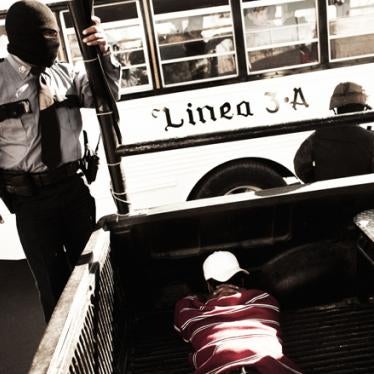(Washington, DC) – Mexico’s Supreme Court has a momentous opportunity to reform the military justice system and eliminate one of the greatest sources of impunity for grave human rights violations, Human Rights Watch said today.
The Supreme Court is reviewing at least 28 cases that challenge the use of military jurisdiction to investigate and prosecute allegations of abuses by military personnel against civilians. The legal challenges stem from a July 2011 Supreme Court judgment that Mexico’s judiciary is obligated to comply with international rulings barring the investigation and prosecution of human rights abuses under the military justice system. The court is scheduled to discuss the cases on August 6, 2012.
“The Supreme Court has the opportunity to ensure an end to the use of an opaque, biased system that has protected members of the military at the expense of their victims,” said José Miguel Vivanco, Americas director at Human Rights Watch.
In its November 2011 report, “Neither Rights Nor Security: Killings, Torture, and Disappearances in Mexico’s ‘War on Drugs,’” Human Rights Watch documented widespread human rights violations by Mexico’s military in its efforts to combat organized crime. A major reason these abuses persist, Human Rights Watch found, is because they are investigated and prosecuted in the military justice system, which lacks the independence and impartiality to judge its own.
In Mexico the secretary of defense wields both executive and judicial power over the Armed Forces. Military judges have little job security and may reasonably fear that the secretary could remove them or otherwise sideline their careers for issuing decisions that he dislikes. Civilian review of military court decisions is very limited. There is virtually no public scrutiny of, or access to information about, what actually happens during military investigations, prosecutions, and trials, which can take years.
The Military Prosecutor’s Office opened nearly 5,000 investigations into human rights violations by soldiers against civilians from 2007 to April 2012, based on information obtained through public information requests by Human Rights Watch. The Mexican military has sentenced only 38 military personnel during that time, according to the Defense Ministry. However, it is not clear in records provided by the Armed Forces how many of those sentenced were fugitives sentenced in absentia, or how many were exonerated following appeals. In addition, 11 of the military personnel counted among those sentenced were punished for crimes committed before 2007.
The July 2011 judgment of the Supreme Court was based on a November 2009 ruling of the Inter-American Court of Human Rights in the case of Radilla Pacheco v. Mexico, which held that “regarding situations that violate the human rights of civilians, military jurisdiction cannot operate under any circumstance.” The ruling was one of four since 2009 in which the Inter-American Court mandated that Mexico ensure that the military justice system not be used to investigate and prosecute human rights abuses.
However, the July 2011 Supreme Court ruling did not establish a legally binding precedent. The cases currently being considered by the court have the potential to set such a precedent.
In the aftermath of these Supreme Court and Inter-American Court rulings, President Felipe Calderón repeatedly expressed commitments to carry out the judgments and reform the use of military jurisdiction. However, cases of alleged military abuses against civilians are still routinely investigated in military jurisdiction, and the military has challenged cases in which civilians have petitioned for investigations of abuses to be transferred from military to civilian courts.
The Supreme Court could reinforce its July 2011 decision by setting out definitively that civilians who are victims of human rights violations have a right to an independent and impartial investigation in the civilian justice system, paving the way to transparency and accountability for human rights crimes perpetrated by the military.
In the draft principles on military justice adopted by the former United Nations Human Rights Commission in 2006, principle No. 9 states that, “In all circumstances, the jurisdiction of military courts should be set aside in favour of the jurisdiction of the ordinary courts to conduct inquiries into serious human rights violations such as extrajudicial executions, enforced disappearances and torture, and to prosecute and try persons accused of such crimes.”
“Last year, the Supreme Court took a historic step toward recognizing victims’ constitutional rights and fulfilling Mexico’s obligations under international treaties,” Vivanco said. “With this ruling, the court can ensure that justice officials carry out its decision and prevent the misuse of military jurisdiction to obstruct victims’ access to justice.”







